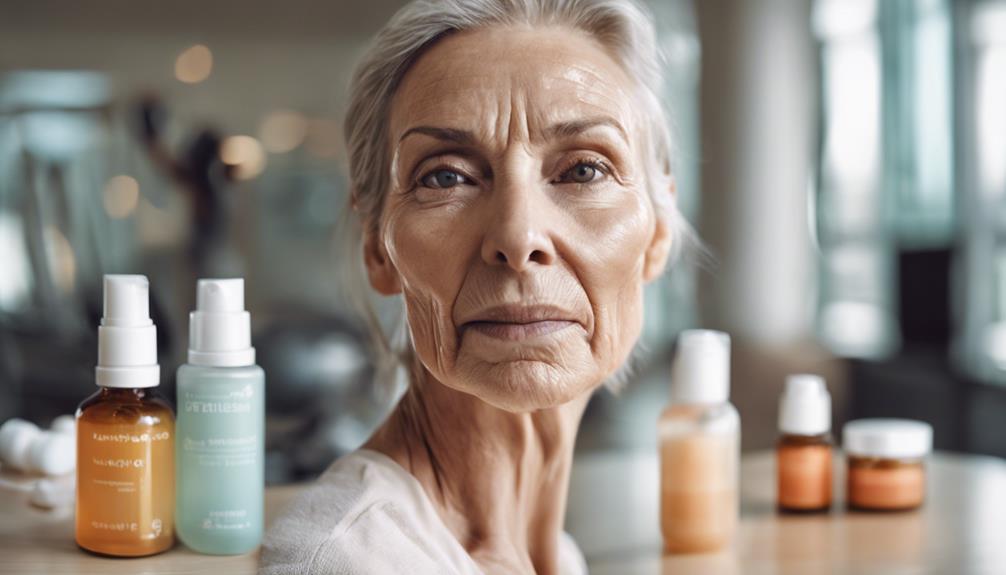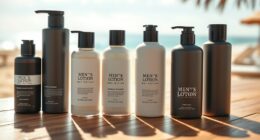Sunscreen is a must for everyone, no matter your skin tone or the weather outside. Many believe only fair skin needs protection, but that's a myth; UV rays harm all skin types. You should use a broad-spectrum sunscreen with at least SPF 30 daily, as this helps prevent sunburn, hyperpigmentation, and even skin cancer. Remember to reapply every two hours, especially if you're swimming or sweating. Makeup with SPF isn't enough; you need a dedicated sunscreen for effective coverage. If you think you know everything about sunscreen, you might be surprised by what comes next.
Key Takeaways
- Sunscreen is essential for all skin tones; UV damage affects everyone regardless of melanin levels.
- Higher SPF numbers provide minimal additional protection; SPF 30 offers about 97% coverage against UVB rays.
- Daily application of broad-spectrum sunscreen (minimum SPF 30) is crucial, even on cloudy days or when indoors.
- Makeup with SPF is insufficient; a separate, dedicated sunscreen is necessary for effective UV protection.
Common Sunscreen Misconceptions
Many people mistakenly think sunscreen is only for sunny days, but UV rays can penetrate clouds, making it necessary to apply it daily.
One common misconception is that darker skin types don't need sunscreen; however, everyone, regardless of skin tone, is at risk of UV damage and skin cancer. So, don't skip it!
Another myth is that higher SPF ratings offer considerably better protection. SPF 30 blocks about 97% of UVB rays, while SPF 100 only blocks 1-2% more. This means regular application every two hours is key, no matter which SPF you choose.
You might also believe that makeup with SPF provides sufficient protection. Unfortunately, the SPF in cosmetics is often inadequate, so applying a dedicated sunscreen underneath is essential for effective coverage.
Lastly, many think sunscreen doesn't expire. In reality, it's important to check expiration dates because the FDA requires that sunscreens maintain their strength for at least three years. Exposure to extreme temperatures can also degrade the product.
Stay informed and apply sunscreen correctly for maximum protection against harmful UV rays!
Understanding SPF Effectiveness

When it comes to SPF ratings, you need to know what they really mean for your skin's protection.
Higher SPF numbers don't always equal better protection, and you must reapply sunscreen every two hours for maximum effectiveness.
Understanding these key points can help you stay safe in the sun.
SPF Ratings Explained
Understanding SPF ratings is vital for choosing the right sunscreen, as they indicate how well a product can protect your skin from harmful UVB rays.
Here's what you need to know about SPF:
- SPF 30 blocks about 97% of UVB rays, while
- SPF 50 blocks around 98%.
- Broad-spectrum sunscreens protect against both UVB and UVA rays, which are linked to skin cancer and skin damage.
- Sunscreen effectiveness heavily relies on how much you apply; using two finger lengths for your face and neck, and about one shot glass for your entire body is recommended.
It's important to remember that higher SPF ratings don't greatly extend your time in the sun. No sunscreen can block 100% of UV rays, so reapplication every two hours is key, especially after sweating or swimming.
SPF ratings primarily measure UVB protection, but don't forget that UVA rays also play a role in skin aging and cancer risk. Always check the sunscreen ingredients and choose products that offer broad-spectrum UV protection for best safety during sunlight exposure.
Reapplication Is Essential
Reapplying sunscreen regularly is vital for maintaining effective skin protection against harmful UV rays. After your initial application, you should reapply sunscreen every two hours, especially if you've been swimming or sweating. Even the best water-resistant formulas only last between 40 to 80 minutes in such conditions, so don't skip this important step.
To maximize your sun protection, apply sunscreen at least 15 minutes before sun exposure. This allows the product to absorb properly and offers the best defense against skin damage. Remember, the amount of sunscreen matters—aim for about two finger lengths for your face and neck and a shot glass full for your entire body to guarantee adequate coverage.
If you're spending a day outside, plan on reapplying every two hours, regardless of SPF rating. Many people think that a higher SPF means they can apply less frequently, but that's a myth. Consistent reapplication is key to achieving effective protection against UV rays and preventing long-term skin issues.
Don't let your guard down; your skin deserves the best care while you enjoy the sun!
Importance of Daily Application

Why skip daily sunscreen application when just 15 minutes of sun exposure can lead to UV damage? The American Academy of Dermatology emphasizes that applying broad-spectrum sunscreen with an SPF of at least 30 every day is essential for your skin health.
Even on cloudy days, up to 80% of UV rays can still penetrate, so consistent protection is critical.
Here are four reasons to make daily sunscreen a habit:
- Prevents Sunburn: Regular application helps shield your skin from painful burns.
- Reduces Skin Cancer Risk: Daily use greatly lowers your chances of developing skin cancer.
- Minimizes Long-Term Skin Issues: Protecting your skin now can prevent signs of aging and other long-term problems later.
- Supports Vitamin D Absorption: You can still enjoy the sun safely while using sunscreen, allowing your skin to absorb necessary vitamin D without risking damage.
Starting this routine early in life sets the stage for healthier skin.
Don't underestimate the power of daily sunscreen application; it's a simple step that makes a considerable difference in your skin's future.
Skin Protection for All Tones

You might think sunscreen is only for fair skin, but that's a common misconception.
All skin tones are at risk for UV damage, and ignoring this can lead to serious consequences, like skin cancer or premature aging.
It's crucial for everyone to use broad-spectrum sunscreen to guarantee proper protection, regardless of your melanin levels.
Importance of Sunscreen Usage
Sunscreen is essential for everyone, as UV damage doesn't discriminate based on skin tone, making consistent protection vital for maintaining skin health.
Whether you have fair or dark skin, the risk of skin cancer and skin damage from UV rays is real. You should prioritize everyday sunscreen use to safeguard your skin.
Here are four important reasons to wear sunscreen daily:
- Prevents Skin Cancer: Regular use of sunscreen can greatly reduce the risk of developing skin cancer.
- Prevents Hyperpigmentation: Sunscreen helps protect against dark spots and uneven skin tone caused by UV exposure.
- Maintains Youthful Skin: Protecting your skin from the sun helps prevent premature aging and keeps your complexion vibrant.
- Broad Spectrum Protection: The American Academy of Dermatology recommends using a broad-spectrum sunscreen with an SPF of at least 30 for ideal protection from the sun.
Risks for All Skin Tones
Regardless of your skin tone, the risks of UV damage are real and necessitate protective measures for everyone.
It's a common misconception that darker skin doesn't need sunscreen, but that's simply not true. All skin types can suffer from UV exposure, making sunscreen fundamental for preventing skin cancer. In fact, a 2016 study showed that melanoma survival rates are lower for nonwhite patients, illustrating that skin cancer affects all ethnicities.
Using sunscreen not only helps protect against skin cancer but also prevents hyperpigmentation and premature aging. It's essential to incorporate effective sun safety practices, regardless of your melanin levels. You should apply broad-spectrum sunscreen with at least SPF 30 every two hours when spending time outdoors.
Increased awareness of these risks and the importance of healthcare equity is significant. Everyone deserves access to information and resources that promote effective skin protection.
Misconceptions About Skin Protection
Many people still believe that only those with lighter skin tones need sunscreen, but this myth can lead to serious skin damage for everyone. Regardless of your melanin levels, UV radiation poses a risk to all skin types. The American Academy of Dermatology emphasizes that broad-spectrum sunscreen is vital for maintaining skin health and preventing skin cancer across all ethnicities.
Here are four key misconceptions about skin protection:
- Darker Skin is Immune: Many think that melanin provides complete protection, but it doesn't. Everyone can suffer from UV damage.
- Only Sunny Days Matter: UV rays can penetrate clouds, so sunscreen is necessary even on overcast days.
- Tanning Equals Protection: Tanned skin is still damaged skin. This can lead to hyperpigmentation and premature aging.
- Sunscreen is Only for the Beach: Daily application is essential. UV rays can harm your skin during everyday activities, too.
Proper Clothing for Sun Safety

Choosing the right clothing can greatly enhance your protection against harmful UV rays while enjoying the outdoors.
Opt for dark, heavy fabrics, as they provide better UV protection than lightweight materials. Tighter weaves in your clothing can also block more UV rays, making them a smart choice for sun safety. Look for clothing with a UPF (Ultraviolet Protection Factor) rating; UPF 30-49 offers very good protection, while UPF 50+ is excellent.
It's essential to remember that wet clothing considerably reduces UV protection, so always change into dry clothes after swimming or sweating.
In addition to protective clothing, accessories play an important role in safeguarding your skin. Wide-brimmed hats shield your face, neck, and ears from direct sunlight, while UV-filtering sunglasses protect your eyes from harmful rays.
Choosing the Right Sunscreen

Finding the right sunscreen is essential for protecting your skin from harmful UV rays while enjoying the outdoors. To guarantee you're well-protected, keep these four key points in mind:
- Broad Spectrum: Choose a sunscreen labeled as broad spectrum to shield against both UVA and UVB rays.
- SPF Rating: Select a product with an SPF of at least 30 for adequate protection.
- Water-Resistant: If you plan to swim or sweat, opt for water-resistant formulas that last 40 to 80 minutes.
- Mineral-Based Options: For sensitive skin, consider mineral-based sunscreens containing zinc oxide or titanium dioxide, which are often gentler.
Additionally, always check ingredient labels to steer clear of harmful substances like oxybenzone.
It's also helpful to look for UPF ratings on clothing for added sun protection, with UPF 30-49 providing very good coverage and UPF 50+ offering excellent protection.
Frequently Asked Questions
What Is a Shocking Fact About Sunscreen?
You might be shocked to learn that up to 90% of UV rays can penetrate clouds. So, even on cloudy days, you still need sunscreen to protect your skin from harmful radiation. Don't skip it!
What Are the Don'ts of Sunscreen?
Did you know that up to 90% of UV rays can penetrate clouds? Don't skip sunscreen on cloudy days. Also, don't rely solely on makeup, ignore expiration dates, or forget to reapply every two hours.
What Are Some of the Most Common and Painful !) Sunscreen Mistakes?
You're likely making common mistakes like not applying enough sunscreen, skipping reapplication, or overlooking areas like your ears and neck. Also, don't forget to check expiration dates; expired sunscreen won't protect you effectively.
How Do You Know if Your Sunscreen Is Breaking You Out?
If your skin's a canvas, and you notice red brushstrokes or pesky bumps after applying sunscreen, it's time to pause. Discontinue use and consult a dermatologist to pinpoint the ingredient causing your skin's distress.
Conclusion
Now that you've unraveled the tangled web of sunscreen myths, it's time to embrace the sun with confidence.
Think of sunscreen as your shield, a trusty companion ready to guard your skin against harmful rays.
Remember, no matter your skin tone, protection is key, and daily application is like watering a garden—you'll reap the benefits over time.
So gear up, choose wisely, and let your skin bask in the glow of safe sunshine.
Shine bright, but stay protected!









